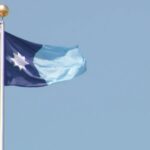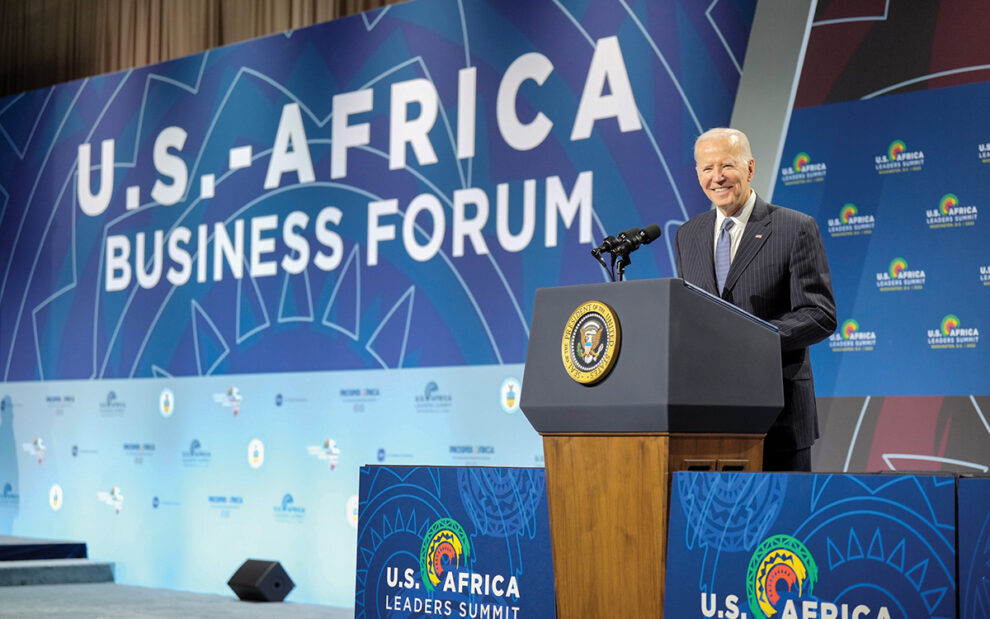In a robust gathering of U.S. and African leaders from the government, private sector, and civil society, the emphasis was on advancing priorities through effective partnerships.
At the second-ever U.S.-Africa Leaders Summit in Washington, D.C. (Dec. 13-15, 2022), President Joseph R. Biden, Vice President Kamala Harris, Secretary of State Antony Blinken, and more than 20 Cabinet members, heads of U.S. government agencies, and members of Congress engaged with delegations from 49 African countries plus the African Union, alongside members of civil society, the private sector, and the African diaspora.
Africa has one of the world’s fastest-growing populations, largest free trade areas, most diverse ecosystems, and one of the largest regional voting blocs in the United Nations. By 2050 Africa will be home to one quarter of the world’s population. The continent hosts vast natural resources, including the world’s second-largest rainforest and 30 percent of the critical minerals needed globally.
The African Continental Free Trade Area (AfCFTA), once fully implemented, will be the fifth-largest economy in the world, with a potential combined GDP of more than $3.4 trillion. Moreover, the dynamism, innovation, and economic growth being spurred by youth across the African continent is noteworthy; it translated into African startups attracting $5 billion in investment in 2021, even in the midst of a global pandemic.
Thus, as the “U.S. Strategy Toward Sub-Saharan Africa” states: “It is impossible to meet this era’s defining challenges without African contributions and leadership.” This is the framework I worked with in etching out the vision for the strategy at the National Security Council and, subsequently, as I led the organization and coordination of the summit. The U.S.-Africa Leaders Summit cell coordinated with robust interagency teams of talented, dedicated colleagues in crafting an event with the overarching goal to deepen our partnership with African countries, institutions, and peoples.
One of the most vital aspects of our Foreign Service tradecraft is building relationships, which ultimately result in partnerships that advance mutually beneficial goals, such as improving lives and livelihoods, promoting economic growth, or advancing democratic values. It is a humbling yet critical task for U.S. national security interests with our African partners. And with stakes as high as they are, one may wonder how the summit would advance U.S. policy priorities in Africa.
Let’s start at the beginning.
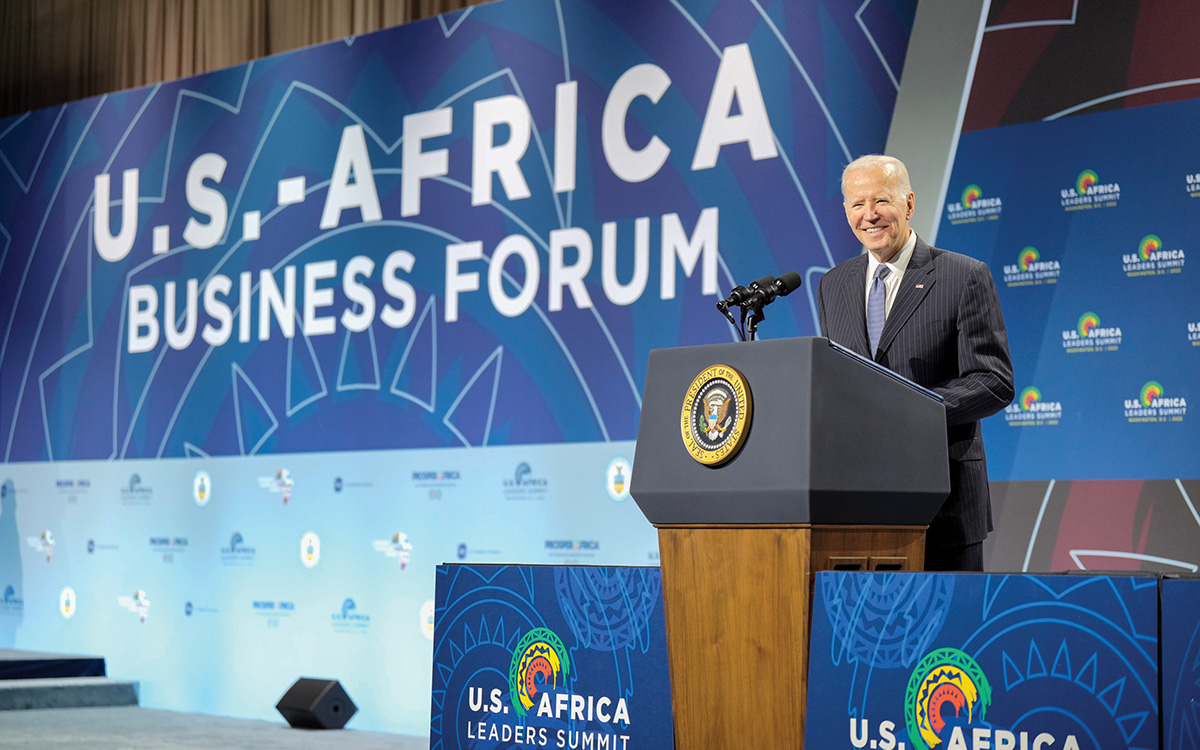
President Joe Biden delivers closing remarks at the U.S.-Africa Business Forum on Dec. 14, 2022, at the Walter E. Washington Convention Center in Washington, D.C.
Adam Schultz / The White House
During his first trip to Africa as Secretary of State, in November 2021, Secretary Blinken affirmed that “Africa will shape the future—and not just the future of the African people, but of the world.” He also conveyed President Biden’s intention to host the U.S.-Africa Leaders Summit in 2022; eight months later, in virtual remarks to the Corporate Council on Africa’s U.S.-Africa Business Summit in Morocco in July 2022, Vice President Harris announced the dates.
“This Summit will demonstrate our enduring commitment to our African partners … will be based on mutual respect, shared interests and values … and a critical element will be to bolster our economic relationship,” stated Vice President Harris. Her remarks were accompanied by a concrete demonstration of the administration’s intentions, the presence of senior leadership from 10 U.S. government agencies, including Millennium Challenge Corporation CEO Alice Albright, U.S. Trade and Development Agency Director Enoh Ebong, U.S. African Development Foundation CEO Travis Adkins, and a delegation of U.S. institutional investors who manage more than a trillion dollars in assets seeking investment on the continent.
The vice president’s public announcement of the dates also set the stage for interagency collaboration and stakeholder consultations to commence in earnest as we prepared for the summit. As special adviser for the U.S.-Africa Leaders Summit, I led my team in conducting extensive consultative sessions with members of Congress, the African diplomatic corps, members of the American and African private sectors, members of civil society, and the African diaspora to feed into the interagency policy process. The aim was to craft a set of discussion topics that would speak to the president’s vision with clearly defined objectives, concrete deliverables, and innovative elements—with an emphasis on partnership.
That collaborative process netted agreement on thematic sessions that focused on shared priorities, including new themes and topics that had emerged since the first summit, in 2014: for instance, the role of civil society; the strength of our African diaspora; health security and improved health systems; climate change, adaptation, and a just energy transition; peace, security, and governance; global food security and food systems resilience; digital transformation; and even cooperation on space exploration.
The first day focused on the role of civil society and the African diaspora, with seven fora on topics ranging from a ministerial on the African Growth and Opportunity Act to cooperation on space, health security, peace and security, and climate adaptation and a just energy transition. The second day was devoted wholly to the U.S.-Africa Business Forum, focused on advancing two-way trade and investment. The third day was reserved for heads of state discussions, focused on the African Union’s Agenda 2063 document (“The Africa We Want,” the organization’s development goals for the 100th anniversary of its founding); greater cooperation with African partners in multilateral fora; and food security on the continent.
The engagements extended beyond the confines of the summit sessions into a series of “partner events,” many of them substantive.
Even more crucial than the discussion topics was who would speak and when. Ensuring all invited heads of state were able to engage meaningfully during one of the sessions over the three days, while also securing U.S. Cabinet officials and senior-level participation, became a true test of diplomatic negotiation skills. While there was no guarantee everyone would be pleased with the speaking schedule, we reached agreement on a roster that fostered robust discussions on shared priorities. In fact, the engagements extended beyond the confines of the summit sessions into a series of “partner events,” many of them substantive. The summit created an environment in which stakeholders congregated to take advantage of the presence of 50 delegations from Africa to participate in a full schedule of events and social engagements throughout the week, further advancing summit goals.
Five heads of state were not invited: Either the African Union had suspended them because of recent military takeovers in their countries (Guinea, Sudan, Mali, Burkina Faso) or the U.S does not have full diplomatic relations (Eritrea).
Delivering on Deliverables
The clear message from our partners in planning the summit was that its success would be measured largely by the achievement of tangible and significant deliverables. Along those lines, President Biden committed to work with Congress to invest $55 billion over the next three years toward developing renewable energy projects and health care systems, increasing trade and investment, expanding internet access and literacy, increasing food supply, strengthening democratic institutions, and improving security.
We crafted and negotiated a vision statement with African Union leadership that outlined the contours of the strengthened partnership, reaffirming our commitment to work collaboratively with African governments, businesses, and publics to realize the vision. Among the extensive new and existing deliverables were a core set of announcements.
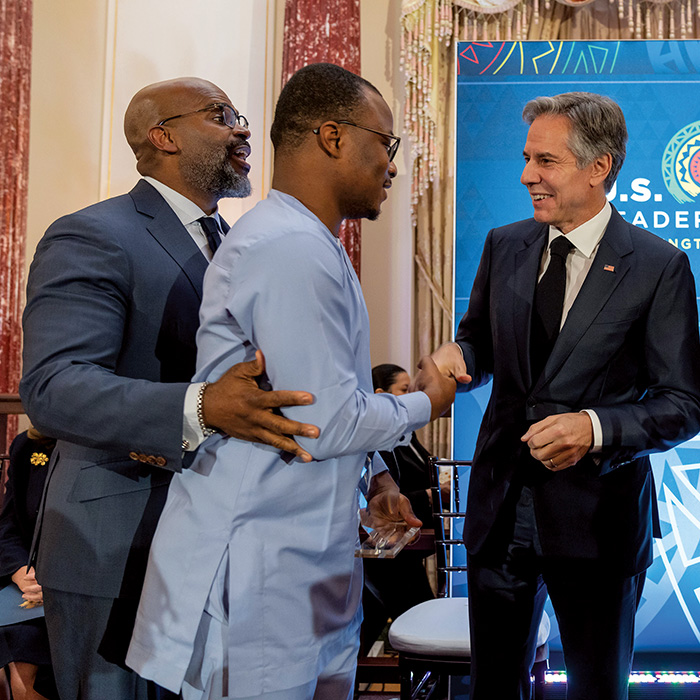
• President Biden announced support for a permanent African Union seat on the G20, furthering the commitment to more inclusive and responsive international institutions.
• Vice President Harris announced more than $100 million toward the expansion of the Young African Leaders Initiative (YALI) to support youth and innovation across the continent, while also drawing on support from the private sector, the diaspora, and educational institutions.
• Vice President Harris announced the historic creation of the President’s Advisory Council on African Diaspora Engagement in the United States, a vehicle to realize the commitment to strengthening cultural, social, political, and economic ties between U.S. government officials, African communities, and the diaspora in the United States.
• U.S. Trade Representative Ambassador Katherine Tai signed a memorandum of understanding with Secretary-General Wamkele Mene of the AfCFTA Secretariat to promote equitable, sustainable, and inclusive trade and attract further U.S. investment on the continent.
• The Millennium Challenge Corporation (MCC) announced its first-ever regional compact to the tune of $504 million with the governments of Benin and Niger, supporting regional economic integration, trade, and cross-border collaboration. At the summit, MCC also announced compact eligibility for The Gambia and Togo and threshold eligibility for Mauritania.
• Not least, in an innovative and promising move, President Biden named retired Career Ambassador Johnnie Carson to be Special Presidential Representative for Summit Implementation, to coordinate follow-up, including a dialogue on future summits, and ensure delivery of the deliverables.
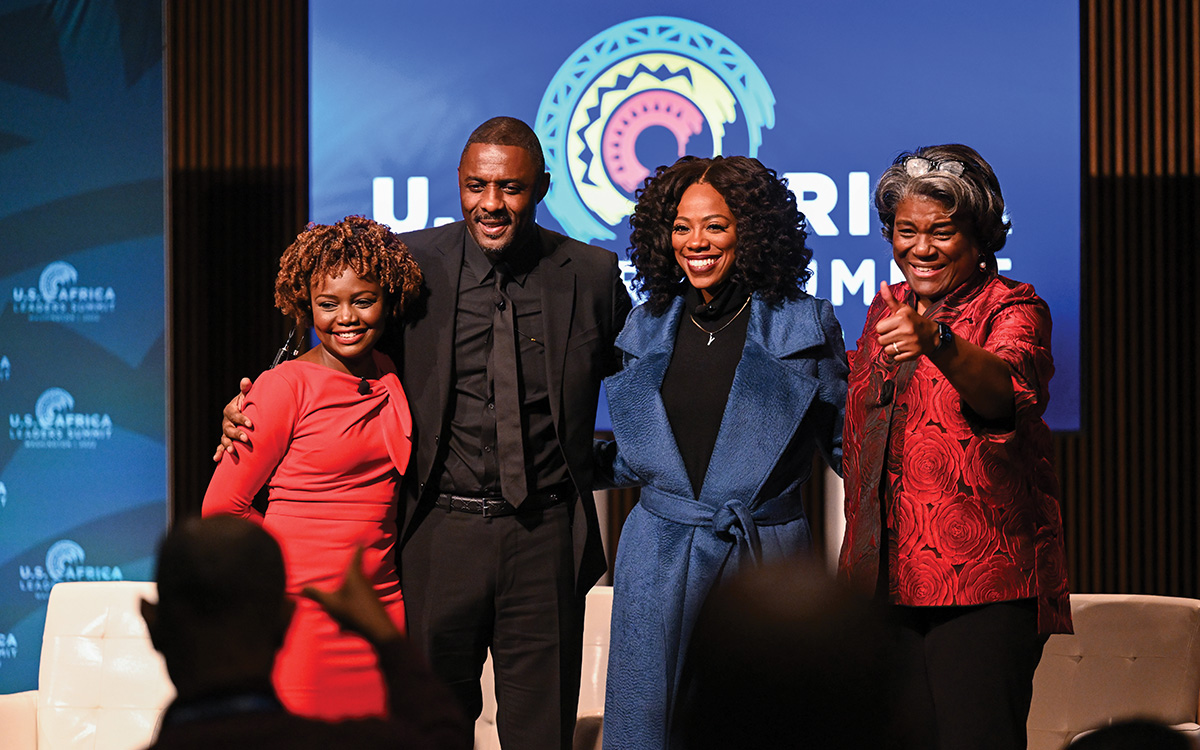
Investment and Innovation Emphasized
Because the strongest demand signal we received during our consultation process concerned mobilizing the power of the American private sector to expand broad-based economic opportunity in Africa, the entire second day was dedicated to the U.S.-Africa Business Forum. President Biden invited CEOs and private sector leadership from more than 300 U.S. and African companies to catalyze investment in the critical sectors: health, infrastructure, energy, agribusiness, and digital infrastructure and access.
The Department of Commerce partnered with the U.S. Chamber of Commerce and the Corporate Council on Africa to bring both American and African CEOs together with heads of state to make connections, finalize current deals, and spawn future business deals. President Biden announced more than $15 billion in new trade and investment deals from American companies with partners on the continent.
As part of the business forum and elsewhere, the focus on innovation, the expansion of digital access and development, and the dynamic role of the African diaspora clearly spoke to important elements of an updated 21st-century partnership. Secretary Blinken hosted an “Innovators Gathering” with more than 250 young entrepreneurs, investors, diaspora celebrities, and local government officials such as actors Idris Elba, Yvonne Orji, African entrepreneur Tony Elumelu, and New York City Mayor Eric Adams, as well as virtual remarks from former President Barack Obama, who established YALI under his tenure.
Secretary Blinken hosted an “Innovators Gathering” with more than 250 young entrepreneurs, investors, diaspora celebrities, and local government officials.
The structure of the event amplified the U.S. commitment to investing in Africa’s next generation to further the innovation currently transforming the continent while harnessing the power of public-private partnerships in bolstering trade and investment opportunities. Further, with new technologies changing the way Africans live and work, President Biden announced the launch of the Digital Transformation with Africa initiative focused on building an open, interoperable, reliable, and secure internet led by African communities.
As the “U.S. Strategy Toward Sub-Saharan Africa” acknowledges: “Our African diaspora is a source of strength. It includes African Americans, and nearly two million African immigrants who maintain close familial, social, and economic connections to the continent … the African immigrant population is among the most educated and prosperous communities in the United States.” The African and Diaspora Young Leaders Forum, held on the first day of the summit with more than 300 diaspora members involved, reflected the commitment to strengthening the dialogue between U.S. officials and the diaspora in the United States.
The View Ahead
In the few short months since the summit, there have been five U.S. government high-level trips to the continent, including Vice President Harris, First Lady Jill Biden, Secretaries Blinken and Yellen, and Ambassador Thomas-Greenfield, and President Biden committed to traveling to the continent this year. During her March visit to Lusaka, Zambia, Vice President Harris announced another $7 billion in new private sector and U.S. government commitments to climate resilience, adaptation, and mitigation in Africa.
The reality is that U.S. engagement with the continent is enduring and has persisted for decades, from the early days of Peace Corps through extensive people-to-people study and exchange programs, health programs such as the U.S. President’s Plan for Aids Relief (PEPFAR) and the President’s Malaria Initiative, MCC, YALI, Power Africa, and Prosper Africa, to name just a few. The summit served to put a finer point on that engagement, particularly at a moment when our global interconnectedness, in both challenges and opportunities, is abundantly clear. From global health to economic growth, to food security, to global peace and security, the import of the African continent not only to U.S. foreign policy but also to our national security is undeniable.
The 2022 U.S.-Africa Leaders Summit has prompted a shift in fostering inclusive partnerships with our African counterparts that will generate beneficial outcomes for future generations of African and U.S. citizens.
Source: Afsa





